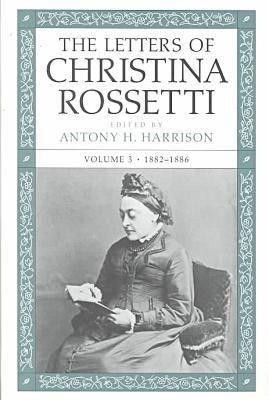
- We will send in 10–14 business days.
- Author: Christina Rossetti
- Publisher: University of Virginia Press
- ISBN-10: 0813919290
- ISBN-13: 9780813919294
- Format: 16.6 x 24.5 x 3.4 cm, kieti viršeliai
- Language: English
- SAVE -10% with code: EXTRA
Reviews
Description
In recent years Christina Rossetti's star has soared. Rossetti (1830-1894) has come to be considered one of the major poets--not just one of the major women poets--of the Victorian era, eclipsing her famous brother. Leading critics have demonstrated how studies of Rossetti's work, her daily life, her relationships with the Pre-Raphaelites, and her interactions with other women authors of the period can help us understand the unique cultural situation of Victorian women writers. When complete in four volumes, this project will make available all of Rossetti's extant letters, almost two-thirds of which have never been published.
The third volume of the Letters covers years in which Christina Rossetti lost several important family members, including her mother, her brother Dante, and a young nephew, Michael, and many close friends. Her preoccupation with their illnesses and with memorializing her brother took its toll on her poetic output. In the face of her loss, she turned increasingly to religion and wrote works of devotional prose--Time Flies, Letter and Spirit--not designed to attract much literary attention. Rossetti herself had been diagnosed with Graves' disease in 1872; by 1874 she had recovered but continued to use her earlier health problems to identify herself as a "semi-recluse," which allowed her a degree of freedom she might not have had otherwise. This self-imposed reclusiveness, however, gave rise to a large correspondence, in which her interests and sensibilities were given broad exposure. She devoted more time to favored causes, including antivivisectionism and the protection of minors, and her letters afford the reader an in-depth perspective on these and other public issues and on the personal values underlying her opinions.
EXTRA 10 % discount with code: EXTRA
The promotion ends in 23d.17:40:10
The discount code is valid when purchasing from 10 €. Discounts do not stack.
- Author: Christina Rossetti
- Publisher: University of Virginia Press
- ISBN-10: 0813919290
- ISBN-13: 9780813919294
- Format: 16.6 x 24.5 x 3.4 cm, kieti viršeliai
- Language: English English
In recent years Christina Rossetti's star has soared. Rossetti (1830-1894) has come to be considered one of the major poets--not just one of the major women poets--of the Victorian era, eclipsing her famous brother. Leading critics have demonstrated how studies of Rossetti's work, her daily life, her relationships with the Pre-Raphaelites, and her interactions with other women authors of the period can help us understand the unique cultural situation of Victorian women writers. When complete in four volumes, this project will make available all of Rossetti's extant letters, almost two-thirds of which have never been published.
The third volume of the Letters covers years in which Christina Rossetti lost several important family members, including her mother, her brother Dante, and a young nephew, Michael, and many close friends. Her preoccupation with their illnesses and with memorializing her brother took its toll on her poetic output. In the face of her loss, she turned increasingly to religion and wrote works of devotional prose--Time Flies, Letter and Spirit--not designed to attract much literary attention. Rossetti herself had been diagnosed with Graves' disease in 1872; by 1874 she had recovered but continued to use her earlier health problems to identify herself as a "semi-recluse," which allowed her a degree of freedom she might not have had otherwise. This self-imposed reclusiveness, however, gave rise to a large correspondence, in which her interests and sensibilities were given broad exposure. She devoted more time to favored causes, including antivivisectionism and the protection of minors, and her letters afford the reader an in-depth perspective on these and other public issues and on the personal values underlying her opinions.


Reviews